Buttermilk Roasted Chicken Dinner
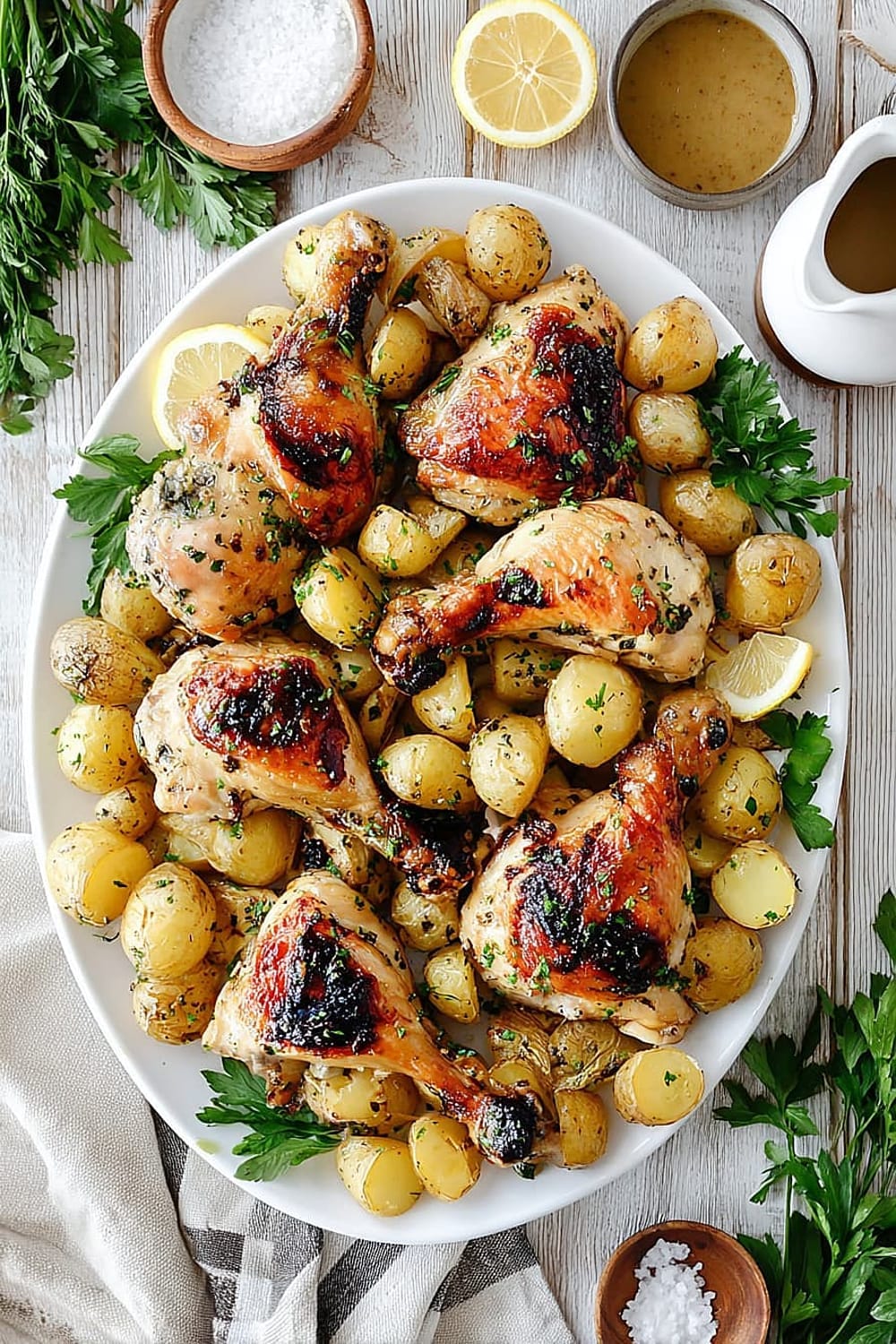
This buttermilk roasted chicken dinner is basically the culinary equivalent of a warm hug from your grandmother, except you get to take all the credit for making it.
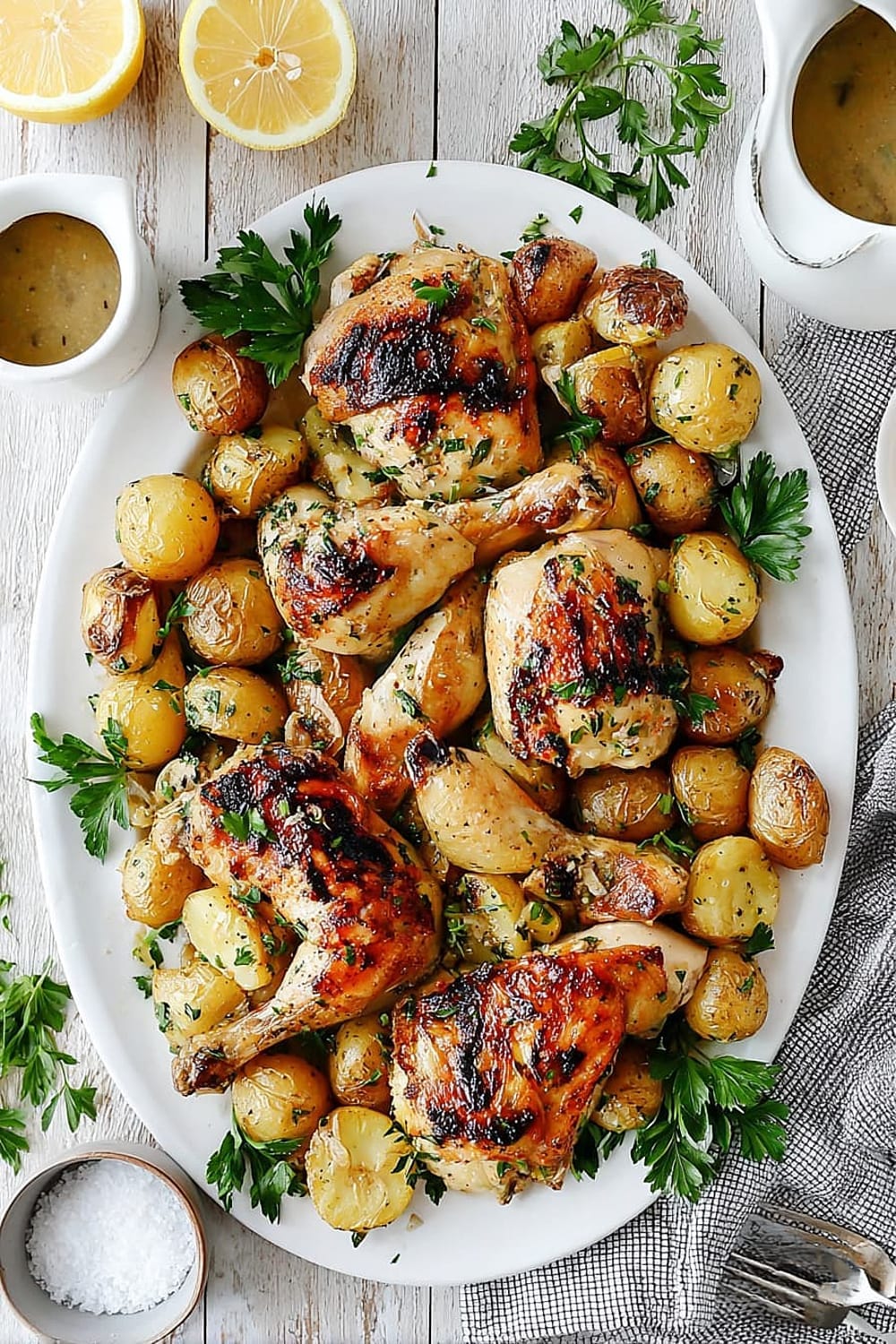
The secret weapon here is that 48-hour buttermilk marinade that transforms ordinary chicken into something so tender and flavorful, your guests will start planning their next visit before they’ve even finished eating.
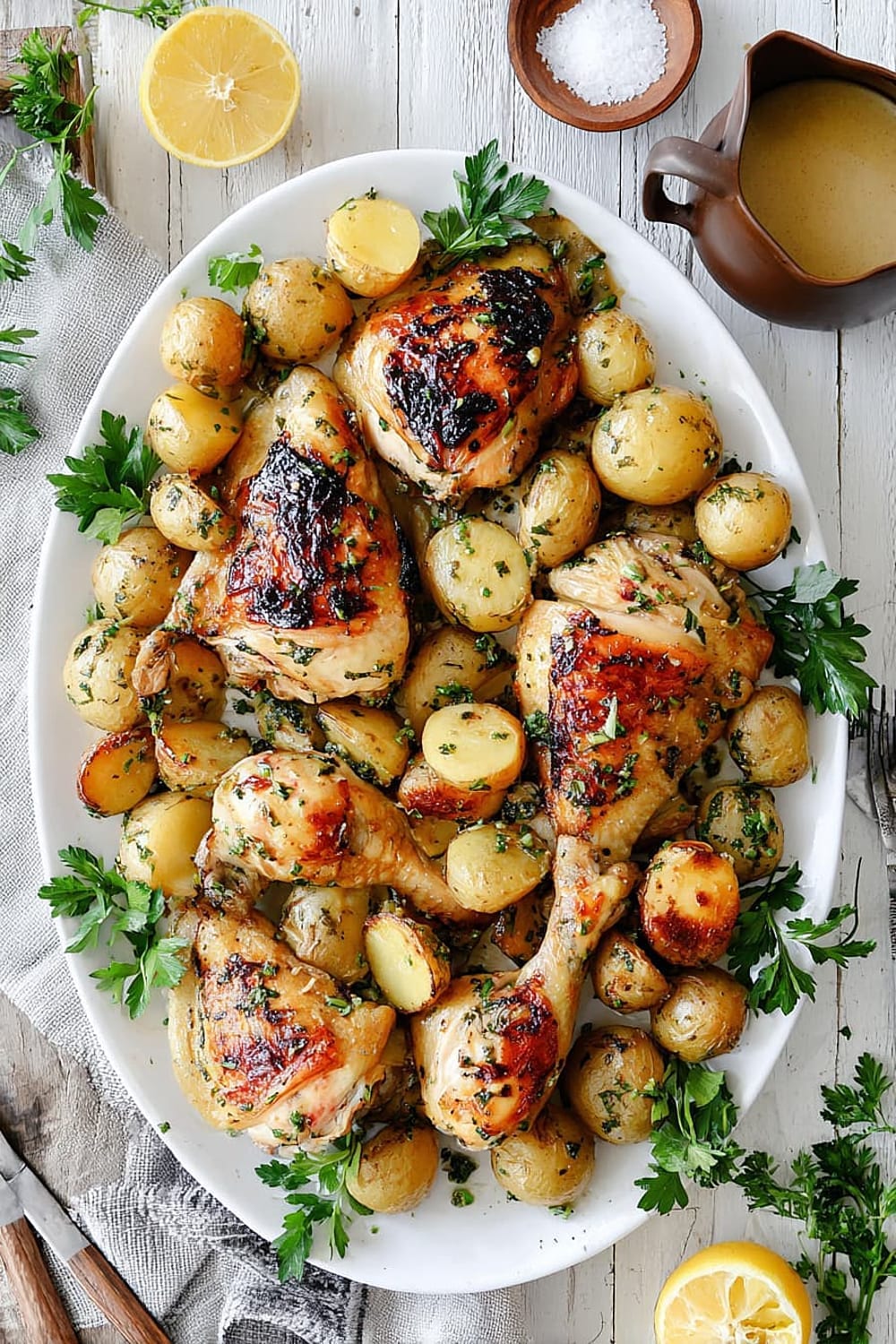
Picture this: golden, crispy-skinned chicken pieces nestled alongside perfectly roasted potatoes, all bathed in herb-infused drippings that smell like Sunday dinner at its absolute finest.
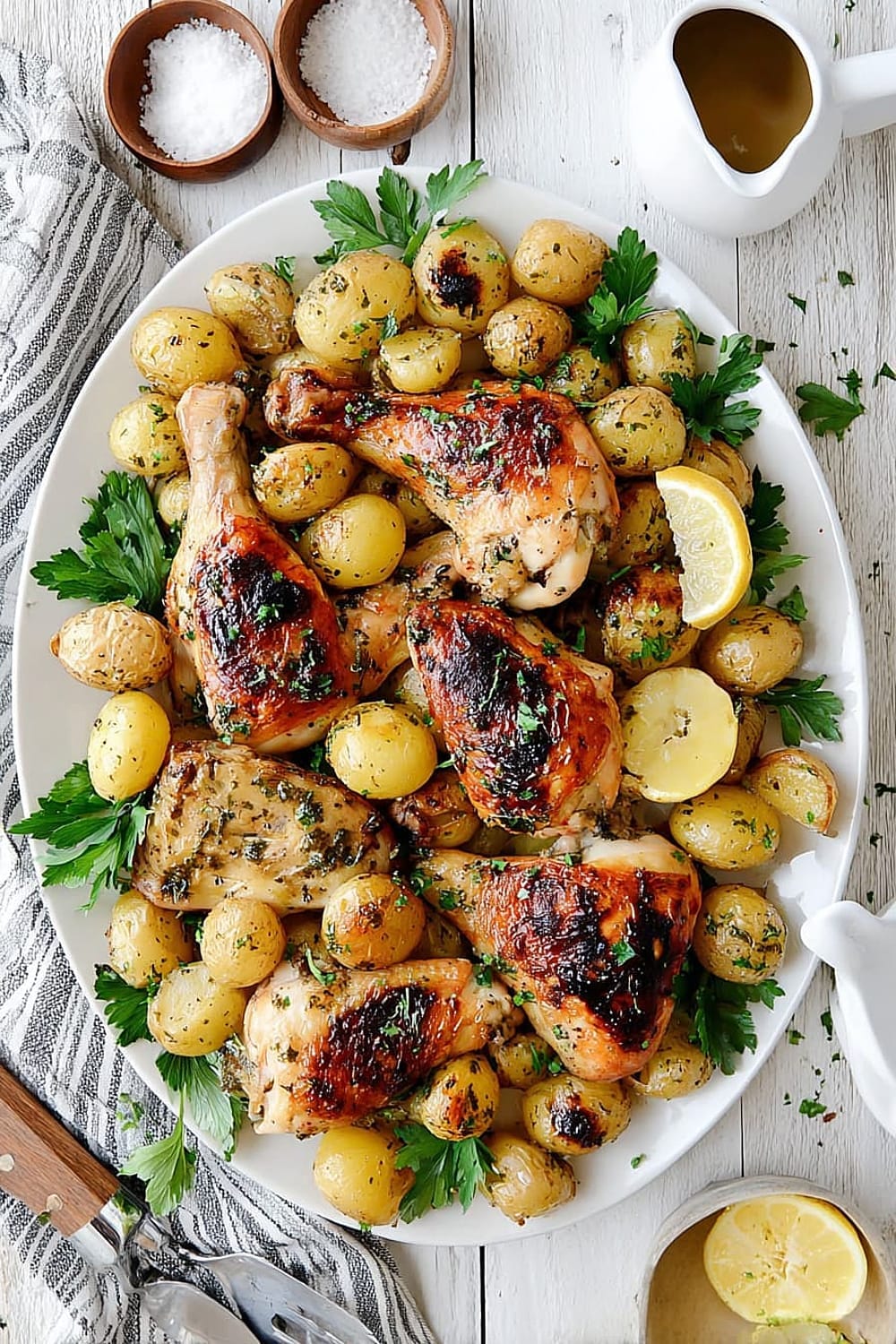
The beauty of this recipe lies in its deceptive simplicity – while it looks and tastes like you’ve been slaving away in the kitchen all day, most of the work happens while you’re binge-watching Netflix.
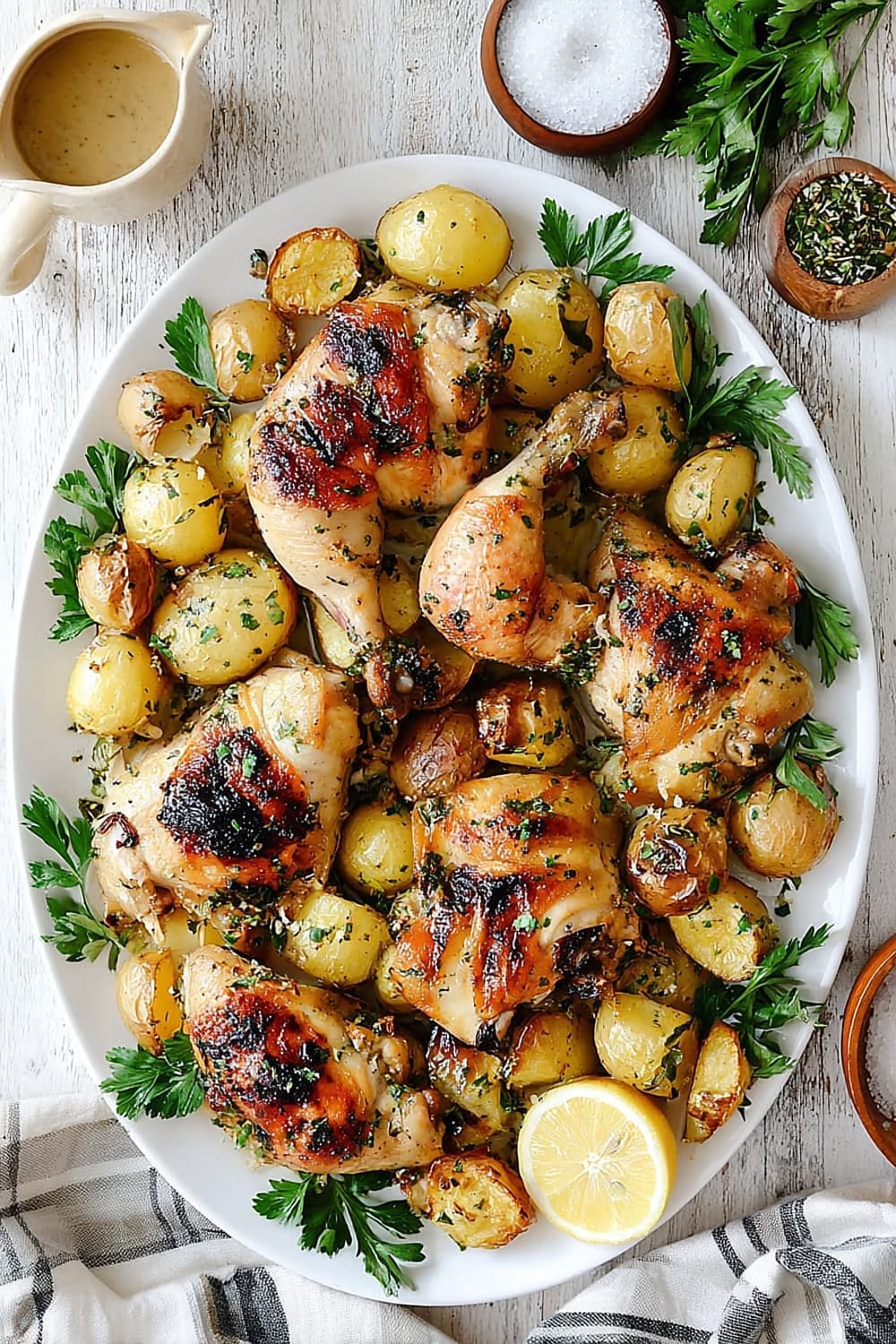
That buttermilk marinade doesn’t just tenderize the meat; it creates this incredible depth of flavor that penetrates every single bite, while the garlic and rosemary add an aromatic punch that’ll have your neighbors mysteriously dropping by around dinnertime.
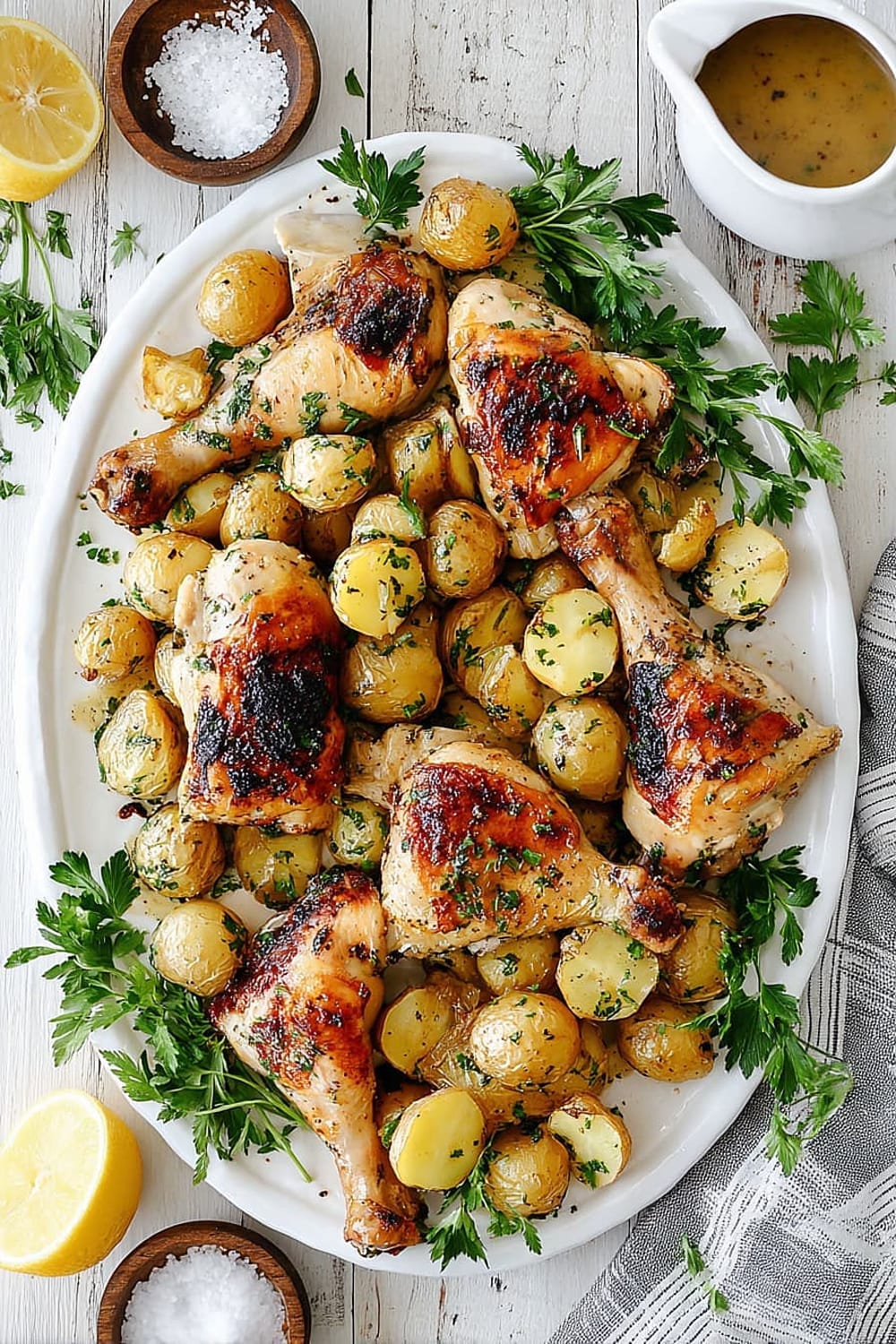
Fair warning: once you master this recipe, you’ll become the designated dinner host for every family gathering, holiday, and “casual” get-together – but honestly, that’s a problem you’ll be happy to have.
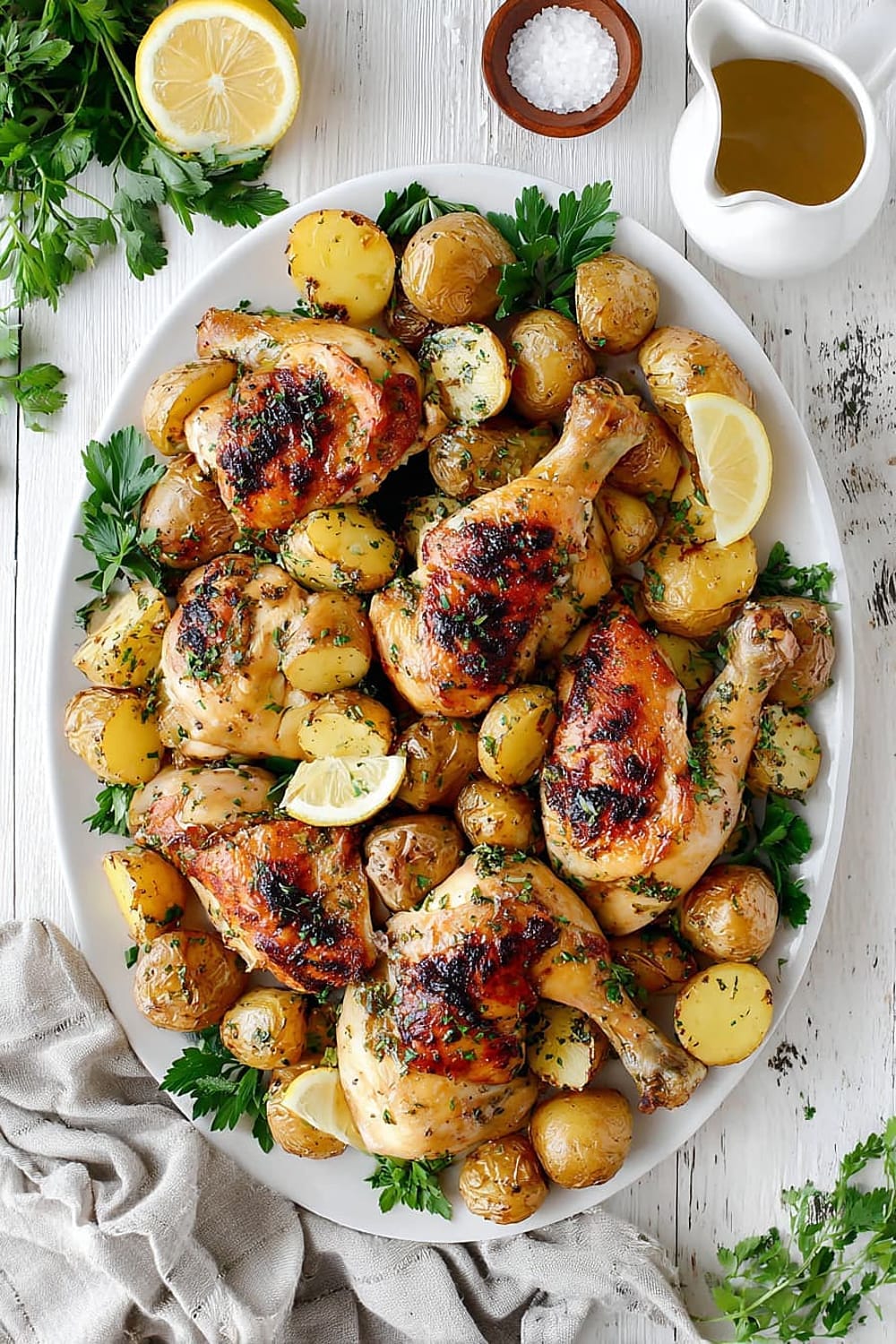
Ingredients
For the buttermilk marinade
- 1 whole chicken, cut up (see notes)
- 8 cloves garlic, smashed and peeled
- 2 tablespoons fresh rosemary, minced
- 1 tablespoon kosher salt
- 1 teaspoon coarse freshly ground black pepper
- 2 tablespoons extra virgin olive oil
- 2 tablespoons honey
- 2 cups buttermilk
For roasting
- Olive oil spray
- 1½ pounds Yukon Gold potatoes, halved
- 1 tablespoon butter
- 1 tablespoon olive oil
- ½ medium lemon, juiced
- Fresh parsley, minced, for garnish
Instructions
Preparation (Two Days Before)
- 1 Divide the cut-up chicken pieces evenly between 2 gallon-sized resealable bags, ensuring each bag has a mix of white and dark meat pieces for balanced marinating.
- 2 To each bag, add 4 cloves smashed garlic, 1 tablespoon minced rosemary, 1½ teaspoons kosher salt, ½ teaspoon coarse black pepper, 1 tablespoon olive oil, and 1 tablespoon honey. The honey helps create that beautiful golden color while balancing the tanginess of the buttermilk.
- 3 Pour 1 cup buttermilk into each bag, then press out as much air as possible before sealing. Massage the buttermilk mixture thoroughly into every piece of chicken, ensuring all surfaces are coated. Place each sealed bag inside a second gallon-sized bag to prevent any potential leaks, then lay flat in a rimmed baking dish.
- 4 Refrigerate for 48 hours, massaging the chicken through the bags every 8 hours or at least twice daily. This consistent agitation ensures the buttermilk’s enzymes work their magic on every inch of the meat, breaking down proteins for maximum tenderness.
Roasting Day
- 5 Preheat your oven to 400°F (200°C) and position the rack in the middle of the oven for even heat circulation around the chicken and potatoes.
- 6 Using clean tongs, remove the marinated chicken from the bags and place on a wire rack set over a rimmed sheet pan to drain for 10-15 minutes. This draining step prevents excess moisture from steaming the chicken instead of roasting it to crispy perfection.
- 7 Spray a large, deep-sided roasting pan or half sheet pan generously with olive oil spray. Arrange the drained chicken pieces skin-side up in the pan, leaving space between pieces, then scatter the halved potatoes around each piece of chicken.
- 8 In a small saucepan over low heat, melt 1 tablespoon butter with 1 tablespoon olive oil until just combined. Pour this mixture evenly over both the chicken and potatoes, which will help achieve that gorgeous golden-brown finish.
- 9 Roast on the middle rack for 45 minutes, allowing the chicken skin to develop a beautiful golden color and the potatoes to begin caramelizing on the edges.
- 10 Remove the pan from the oven and carefully baste the chicken with the accumulated pan drippings using a large spoon or baster. Reduce oven temperature to 350°F (175°C), rotate the pan 180 degrees for even browning, then return to the oven for an additional 15-20 minutes.
- 11 Check that chicken reaches an internal temperature of 165°F (74°C) in the thickest part of the thigh, and potatoes are fork-tender with crispy, golden edges.
- 12 Transfer the chicken and potatoes to a serving platter and cover loosely with aluminum foil to keep warm while you prepare the finishing touches.
- 13 Squeeze the fresh lemon juice directly into the pan drippings, scraping up any browned bits, then pour this flavorful mixture over the plated chicken and potatoes. Sprinkle generously with minced fresh parsley and serve immediately.
Recommended Equipment and Kitchen Tools
Essential Tools (for best results)
- Large resealable bags – Gallon-sized freezer bags work best for marinating, allowing maximum contact between buttermilk and chicken while preventing leaks
- Wire cooling rack – Essential for draining marinated chicken properly; prevents soggy skin by allowing air circulation
- Rimmed sheet pan – Catches drips during draining and provides stable roasting surface
- Instant-read thermometer – Takes the guesswork out of doneness, ensuring perfectly cooked chicken every time
Helpful Upgrades
- Cast iron roasting pan – Retains heat beautifully and creates superior browning on both chicken and potatoes
- Silicone-tipped tongs – Won’t scratch your pans and provide secure grip on slippery marinated chicken
- Digital kitchen scale – For precise measurements, especially helpful when scaling this recipe up for larger gatherings
Nice-to-Have Options
- Basting brush – Makes it easy to distribute the butter-oil mixture evenly over chicken and potatoes
- Microplane grater – Perfect for getting fine, aromatic lemon zest to brighten the final dish
- Large mixing bowls – Useful for tossing potatoes with seasonings before adding to the roasting pan
Recipe Variations and Dietary Modifications
Herb Variations
- Mediterranean style – Replace rosemary with fresh thyme, oregano, and a pinch of dried herbs de Provence
- French-inspired – Use fresh tarragon and sage with a splash of white wine in the marinade
- Southern twist – Add fresh sage and a teaspoon of smoked paprika to the buttermilk mixture
Vegetable Substitutions
- Root vegetable medley – Replace potatoes with carrots, parsnips, and turnips cut into similar-sized pieces
- Seasonal options – Try butternut squash cubes in fall, or Brussels sprouts and sweet potatoes in winter
- Summer variation – Use halved zucchini, bell peppers, and cherry tomatoes (add these during the last 20 minutes)
Dairy-Free Modifications
- Coconut milk marinade – Replace buttermilk with full-fat coconut milk mixed with 2 tablespoons lemon juice
- Cashew cream alternative – Blend 1 cup soaked cashews with 1½ cups water and 2 tablespoons apple cider vinegar
- Use dairy-free butter – Substitute with vegan butter or additional olive oil for the final basting
Spice Level Adjustments
- Mild version – Reduce black pepper and add sweet paprika for color without heat
- Spicy kick – Add cayenne pepper, red pepper flakes, or hot sauce to the marinade
- Smoky flavor – Include smoked paprika and a touch of liquid smoke in the buttermilk mixture
Nutritional Information and Health Benefits
Key Nutritional Highlights
This buttermilk roasted chicken dinner provides approximately 385 calories per serving, with a balanced macronutrient profile featuring 32 grams of high-quality protein, 18 grams of healthy fats, and 22 grams of complex carbohydrates from the Yukon potatoes. The buttermilk marinade adds beneficial probiotics while keeping the chicken incredibly moist without excess added fats.
Health Benefits of Main Ingredients
The chicken provides complete protein containing all essential amino acids, plus important B vitamins like niacin and B6 that support energy metabolism and brain function. Fresh garlic offers powerful antioxidant compounds including allicin, which supports immune function and cardiovascular health. Rosemary contains rosmarinic acid, a potent anti-inflammatory compound that may help improve circulation and cognitive function. The Yukon potatoes contribute vitamin C, potassium for heart health, and resistant starch that feeds beneficial gut bacteria.
Dietary Considerations
This recipe is naturally gluten-free and fits well into Mediterranean and whole food dietary patterns. The buttermilk provides calcium and probiotics, while the herbs contribute antioxidants without added sodium. Each serving provides about 15% of daily vitamin C needs and 20% of daily protein requirements for most adults.
Smart Swaps and Ingredient Substitutions
Buttermilk Alternatives:
- Regular milk + acid → Mix 2 cups whole milk with 2 tablespoons lemon juice or white vinegar; let sit 5 minutes
- Greek yogurt mixture → Thin 1 cup plain Greek yogurt with 1 cup milk and 1 tablespoon lemon juice
- Kefir substitute → Use plain kefir directly as a 1:1 replacement for tangier flavor
Herb Substitutions:
- Fresh rosemary → Use 2 teaspoons dried rosemary, or substitute with fresh thyme (same amount)
- Fresh garlic → Replace with 2 teaspoons garlic powder, though fresh provides better flavor penetration
- Fresh parsley → Substitute with fresh chives, cilantro, or green onion tops for different flavor profiles
Potato Alternatives:
- Yukon Gold potatoes → Red potatoes, fingerlings, or baby potatoes work equally well
- Lower-carb option → Replace with cauliflower florets, radishes, or turnips (reduce cooking time by 10 minutes)
- Sweet potato swap → Use for added beta-carotene, but reduce honey in marinade to balance sweetness
Honey Replacements:
- Maple syrup → Use same amount for similar caramelization
- Brown sugar → 1½ tablespoons packed brown sugar per tablespoon honey
- Sugar-free option → Use sugar-free honey substitute or omit entirely
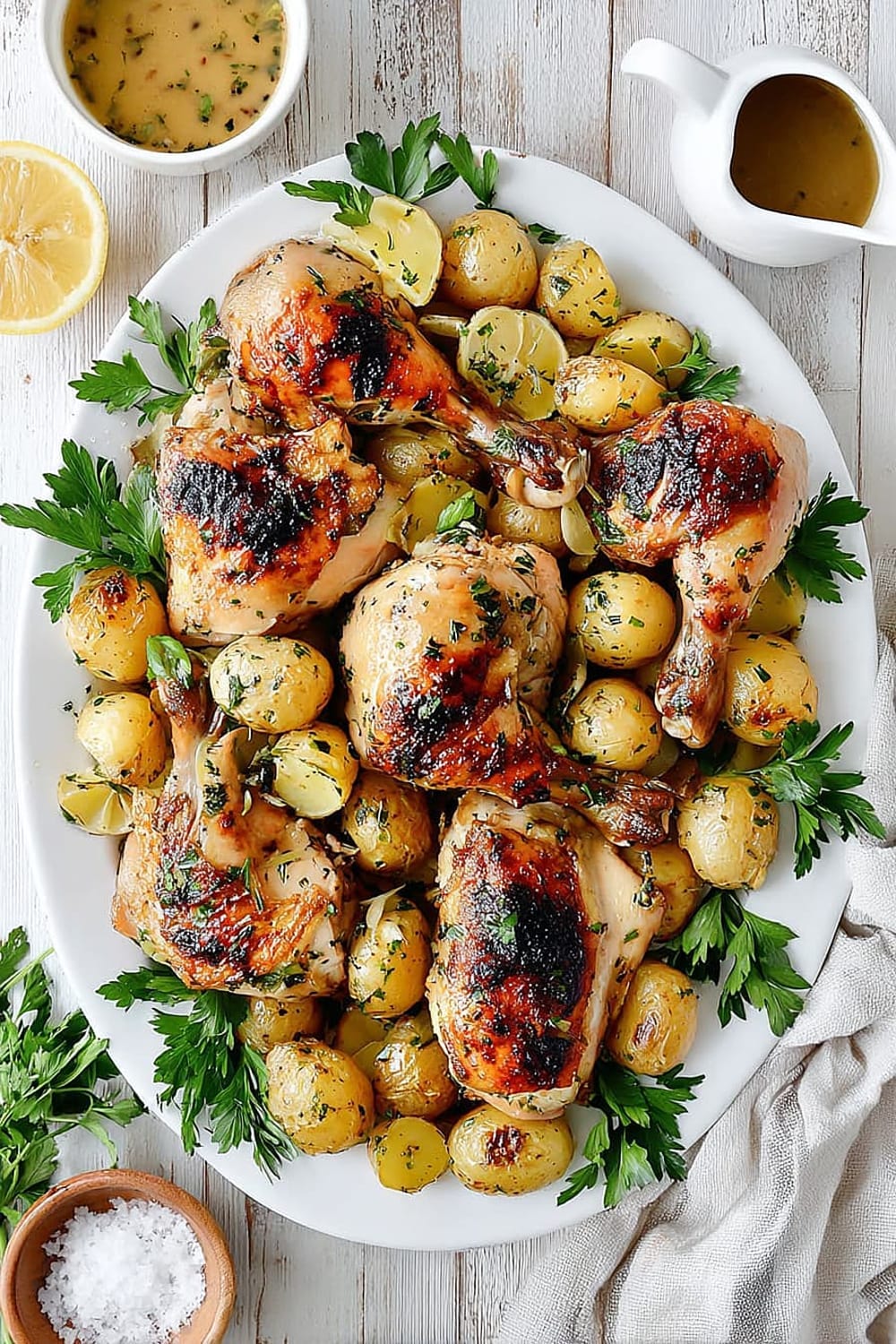
Make It Diabetes-Friendly
Carbohydrate Modifications:
- Reduce potato portion → Use only 1 pound potatoes instead of 1½ pounds, reducing carbs by approximately 8g per serving
- Add non-starchy vegetables → Include bell peppers, zucchini, and broccoli to increase volume without significantly impacting blood sugar
- Cauliflower substitution → Replace half the potatoes with cauliflower florets to cut carbs by roughly 12g per serving
Sugar Reduction Strategies:
- Honey adjustment → Reduce honey to 1 tablespoon total (½ tablespoon per bag) or substitute with sugar-free honey alternative
- Natural sweetness → The buttermilk’s natural lactose provides subtle sweetness, making honey reduction barely noticeable
- Herb enhancement → Increase rosemary and garlic to boost flavor without adding carbohydrates
Portion and Pairing Tips:
- Optimal serving size → Stick to 4-5 oz chicken with ¾ cup potatoes for approximately 18g total carbohydrates
- Protein focus → The high protein content (32g per serving) helps slow carbohydrate absorption
- Fiber addition → Serve with a large green salad or steamed vegetables to add fiber and reduce glycemic impact
Total Carb Reduction: These modifications can reduce total carbohydrates from 22g to approximately 12-15g per serving while maintaining the recipe’s satisfying, flavorful character.
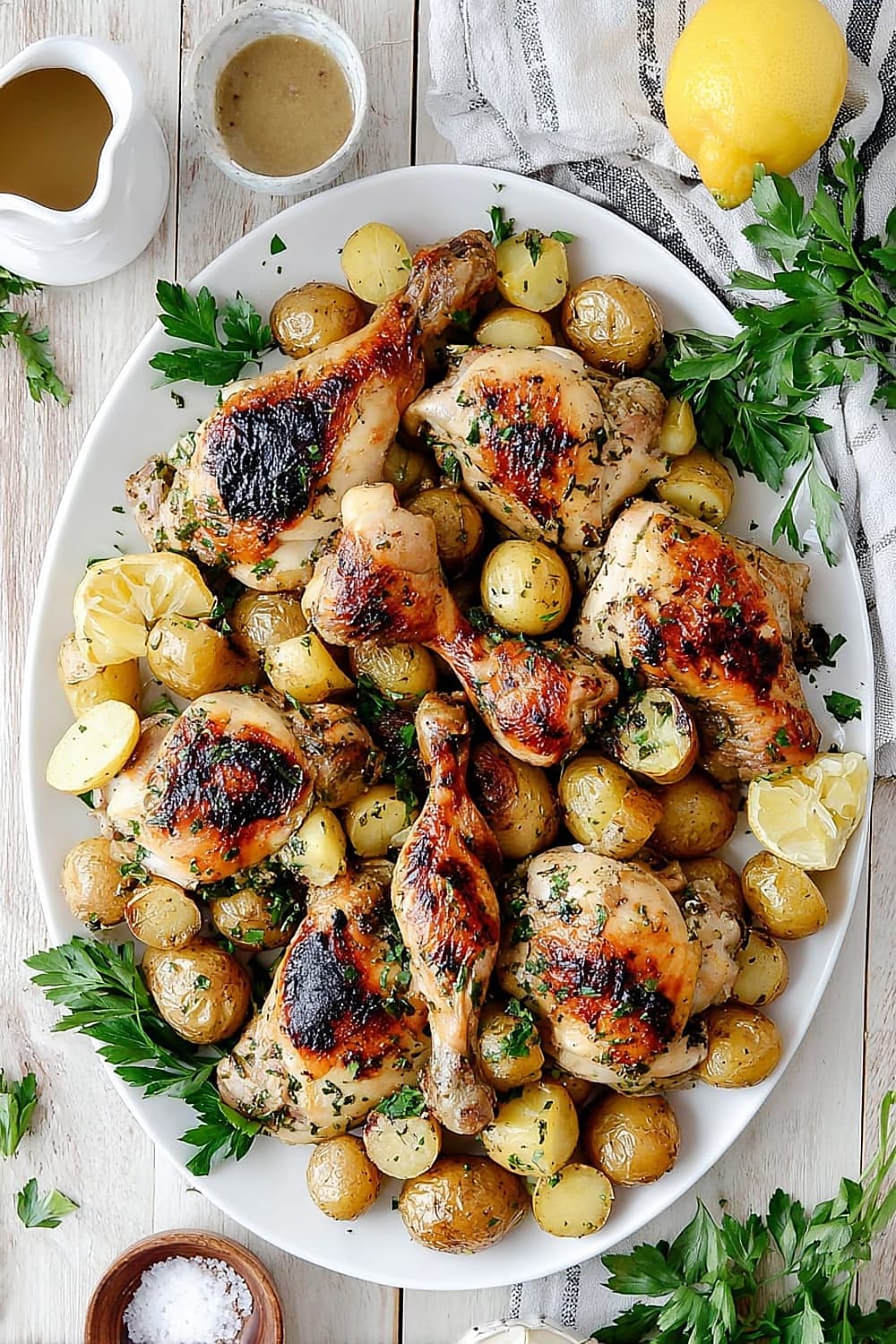
Perfect Pairing Suggestions
Wine and Beverage Pairings
The herb-crusted, buttermilk-tender chicken pairs beautifully with medium-bodied white wines like Chardonnay or Viognier, which complement the rich, roasted flavors without overwhelming the delicate herbs. For red wine lovers, a light Pinot Noir or Côtes du Rhône provides earthy notes that echo the rosemary and garlic. Non-alcoholic options include sparkling apple cider, herbed lemonade, or a robust iced tea with fresh mint.
Complementary Side Dishes
This hearty main course shines alongside fresh, crisp salads like arugula with lemon vinaigrette or a classic Caesar salad that cuts through the richness. Roasted seasonal vegetables such as asparagus, green beans, or Brussels sprouts add color and nutritional balance. Consider warm dinner rolls or crusty artisan bread for sopping up those incredible pan drippings.
Complete Meal Ideas
Start with a light appetizer like bruschetta or a cheese and charcuterie board to build anticipation. For special occasions, add roasted carrots with honey glaze and finish with a simple fruit dessert like berry crumble or lemon bars. The casual family dinner version pairs perfectly with steamed broccoli and warm biscuits.
Seasonal and Occasion Suggestions
This recipe excels as a Sunday family dinner year-round, holiday entertaining for intimate gatherings, or special date nights at home. Spring calls for fresh pea salads, summer demands corn on the cob, fall welcomes roasted root vegetables, and winter begs for warm, crusty bread and hearty greens.
Pro Tips and Troubleshooting
Marinating Success Secrets
The 48-hour marination is non-negotiable for maximum tenderness – shorter times won’t allow the buttermilk’s enzymes to fully break down the proteins. Massage the bags regularly to ensure even distribution of flavors and prevent any pieces from sitting in marinade pockets. Double-bagging prevents disasters and protects your refrigerator from potential leaks that could ruin other foods.
Achieving Perfect Crispy Skin
Pat the chicken completely dry after draining from marinade – excess moisture is the enemy of crispy skin. Don’t overcrowd the pan; chicken pieces should have space around them for proper air circulation. Start at higher temperature (400°F) to jumpstart browning, then reduce heat to ensure even cooking without burning.
Storage and Make-Ahead Strategies
Leftover chicken keeps in the refrigerator for up to 4 days and reheats beautifully in a 350°F oven for 10-15 minutes. Freeze marinated chicken in bags for up to 3 months – thaw completely before roasting. Prep vegetables a day ahead by washing, cutting, and storing in the refrigerator.
Common Troubleshooting
If chicken browns too quickly, tent with foil and reduce temperature by 25°F. For uneven cooking, use an instant-read thermometer to check multiple pieces, as dark meat takes longer than white meat. Dry chicken usually means overcooking – trust the thermometer and remove at exactly 165°F internal temperature.
This buttermilk roasted chicken dinner proves that the most memorable meals don’t require complicated techniques or exotic ingredients – just quality ingredients, proper timing, and a little patience. The magic happens in that 48-hour transformation, where ordinary chicken becomes extraordinarily tender and flavorful, while the simple roasted potatoes soak up all those incredible herb-infused drippings. Whether you’re feeding your family on a Sunday evening or impressing dinner guests, this recipe delivers restaurant-quality results with home-kitchen simplicity that’ll have everyone asking for seconds and the recipe.